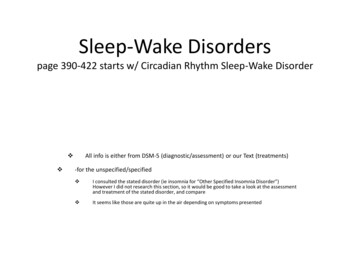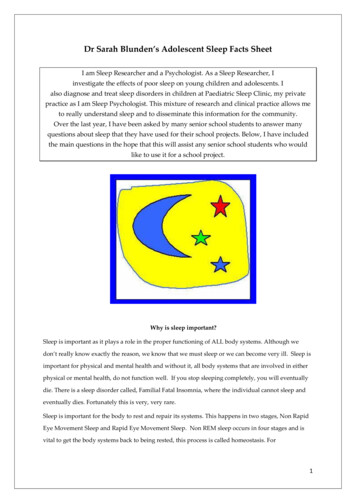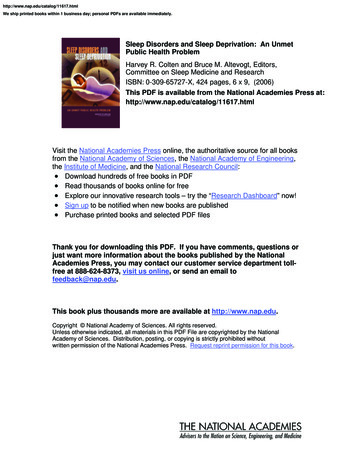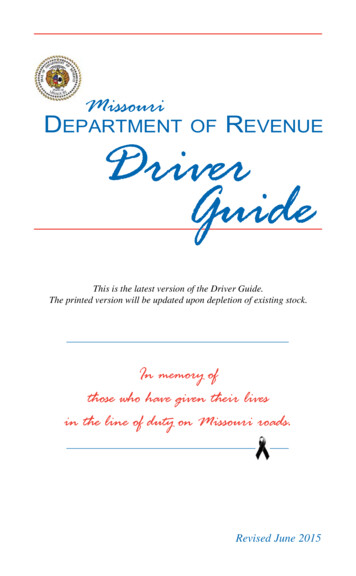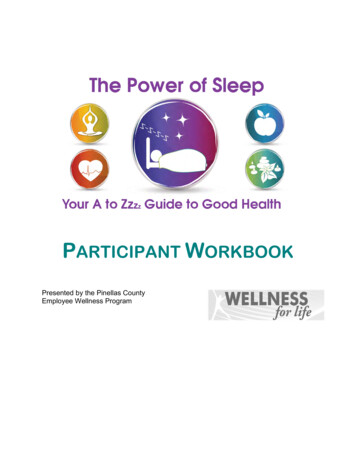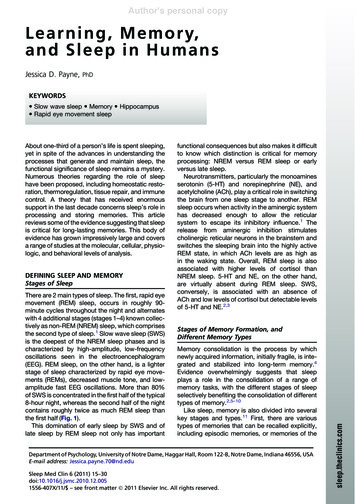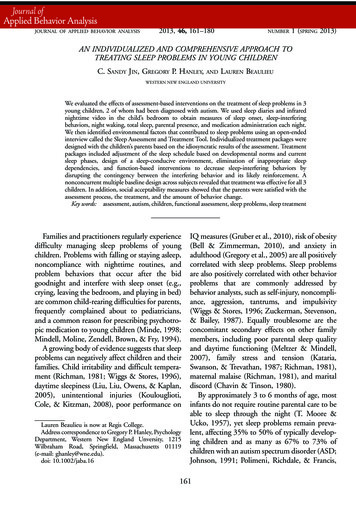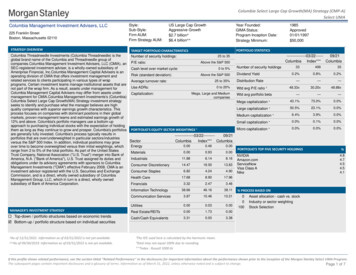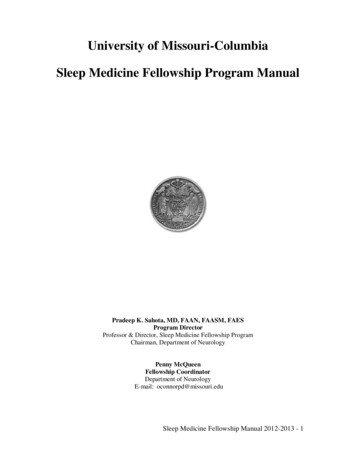
Transcription
University of Missouri-ColumbiaSleep Medicine Fellowship Program ManualPradeep K. Sahota, MD, FAAN, FAASM, FAESProgram DirectorProfessor & Director, Sleep Medicine Fellowship ProgramChairman, Department of NeurologyPenny McQueenFellowship CoordinatorDepartment of NeurologyE-mail: oconnorpd@missouri.eduSleep Medicine Fellowship Manual 2012-2013 - 1
Table of ContentsItemNote of WelcomeMissionFaculty InformationAdministrative, Clinic Staff & Current FellowFaculty Qualifications & ResponsibilitiesFacilities & ResourcesEducational ProgramCurricular ContentCore competency based educational objectives for the programGoals & Objectives for each component of trainingSummary of Core Competency Teaching & Evaluation MethodsEducational Methods & Core Competencies CoveredAssessment MethodsSupervision of Fellow Patient Care ActivitiesProgressive responsibilityLongitudinal Care ExperienceMonthly Rotation FormatEducational PoliciesClinical PoliciesDepartment PoliciesInstitutional PoliciesDepartment Support for the FellowFinancial Advice/Counseling ResourcesGrants and Contracts Contact ListAdditional Information for further trainingPage 868-6970Sleep Medicine Fellowship Manual 2012-2013 - 2
SLEEP MEDICINE FELLOWSHIP MANUALMU SLEEP DISORDERS CENTER & SLEEP MEDICINE PROGRAMProgram Director’s Note of WelcomeWelcome to the Sleep Medicine Fellowship program at the University of Missouri HealthSciences Center and HST VA Medical Center. You are joining a program of excellence inpatient care, education and clinical research. We are extremely proud of our faculty, our fellows,our staff, our educational programs as well as our medical facilities.As you start your training, you will see the emphasis on four key ingredients.1). We expect excellence in clinical care for our patients.2).We will deliver this care with integrity, caring, compassion, and respect for the patients,families and for all others.3).Excellence in clinical care will be accompanied by excellence in education – in learning andteaching.4).You will be expected to keep up with current research and literature in Sleep Medicine andwill have opportunities to participate in research.The teaching program is primarily dedicated to developing comprehensive understanding of thefield of Sleep Medicine. Your rotations will comprise of activities as recommended and approvedby the ACGME and American Board of Sleep Medicine. The mission of the training is to provideexcellence in education to our fellows so that they become superb, competent and confidentphysicians. In our endeavor to continually improve the program, your feedback is needed andwill be kept confidential. Just as faculty and staff will evaluate you, you will evaluate staff andfaculty. You will also be evaluated by the patients.You will have access to the educational material needed to complete your tasks and achieve yourgoals. You will be an important part of the Sleep Medicine program family. As such, you willalways be welcome to discuss any issues of concern with the faculty or with director of theprogram. Your learning will also include help in educating other residents (rotating residents andfellows), technologists, medical students, nurses and health care professionals. We are a team andwe shall all work together to provide the best care to our patients and best educationalopportunities for our trainees at all levels.In summary, we are committed to providing you the environment, the opportunity, to help youexcel in the field of Sleep Medicine and to develop into caring, compassionate, superb physicians.We are here to help you in any way that we possibly can.I wish you the very best.Pradeep SahotaPradeep Sahota M.D., F.A.A.N., F.A.A.S.M., F.A.E.S.Professor & Chairman, Dept. of NeurologyDirector, Sleep Medicine Fellowship ProgramSleep Medicine Fellowship Manual 2012-2013 - 3
Mission of the Sleep Medicine ProgramThe primary mission of the program is:“Excellence in patient care, education and research”.In keeping with the overall vision and mission of the University of Missouri Health SciencesCenters, the Sleep medicine program will:1.Provide excellent clinical care to our patients with a variety of sleep disorders,as well as demonstrate care and respect for their families.2.Provide excellent education to our trainees, to our medical students, to rotatingresidents, to other health care personnel, and to the Missouri population andsociety in general.3.Continue the ongoing clinical research and find collaborative opportunities forsleep medicine research.4.With support from UMHC, seek to expand sleep medicine academic activities atthe University of Missouri to provide greater opportunities for our trainees aswell as our patients.All clinicians, trainees, and staff, are responsible for maintaining this standard of excellence byproviding patient centered services on an inpatient, outpatient and consultative basis.Remember: Our patients come first.We should treat our patients as we would like our own family to be treated here.Please respect your patients and their families.We are grateful that we have the opportunity to serve them.Sleep Medicine Fellowship Manual 2012-2013 - 4
FACULTYThe Sleep Medicine program consists of four core faculty members, & several key facultymembers with expertise in Sleep Medicine - four are board certified in Sleep medicine. Areas ofexpertise/interest include neurology, pulmonary medicine, cardiology, psychosomatic medicine &psychology, child health, and otolaryngology. There are several physicians with jointappointments/educational activities in the program. Also, a faculty member with expertise inbasic science of Sleep Medicine is currently involved in research in this area. In addition, facultymembers from other departments such as internal medicine, family and community medicine,anesthesia, physical medicine and rehabilitation are available for consultation and interaction withSleep Medicine team.FACULTYP. Sahota MD, FAAN, FAASM, FAES. Professor & Chair, Department of Neurology; Director,Sleep Medicine Fellowship Program; Office Phone: 573-882-3135M. Sivaraman MD, FAASM, Associate Professor, Neurology & Sleep Medicine;Associate Director, MU sleep Disorders Center; Office Phone: 573-882-3133J. Johnson DO, Assistant Professor, Pulmonary & Critical Care Medicine;Director, VA Sleep Disorders Center; Office Phone 573-882-2991M. Goyal MD, Assistant Professor, Neurology; Office Phone 573-882-3135N. Patel MD, Professor, Department of Child Health & Neurology; Office phone: 573-882-5779G. Flaker MD, Professor, Cardiology; Phone 573-882-2296K. Aggarwal MD, Professor, Cardiovascular MedicineR. Weachter MD, Associate Professor, Cardiology; Phone 573-882-2296D. Chang MD, Associate Professor, ENT; Phone 882-8173Z. Ner MD, Assistant Professor, Department of Child Health – Pulmonary Medicine; Phone 573882-6978C. Hemme MD, Assistant Professor, PsychiatryA. Muzaffar MD, Associate Professor, Plastic SurgeryJ. Slaughter MD, Associate Professor, Psychosomatic Medicine & Neurology Office Phone:573-882-3133H. Sohal MD, Assistant Professor, Pulmonary, Critical Care & Environmental MedicineD. Folzenlogen MD, Associate Professor, RheumatologySleep Medicine Fellowship Manual 2012-2013 - 5
J. Marshall MD, Professor, GastroenterologyS. Lucchese MD, Assistant Professor, NeurologyNon-Physician FacultyM. Thakkar Ph.D, Associate Professor & Director, Research; Office 573-814-6000E Hart PhD, Associate Professor, Dept. of PsychologyADMINISTRATIVE STAFFP. McQueen, Fellowship Coordinator, Sleep Medicine program; Phone 573-882-8668F. Zhang, Administrator, Neurology; Office Phone: 573-882-9698B. March, Executive Assistant to Chairman/Director of Fellowship Program; 882-3135L. Moss, Reimbursement Assistant; Office Phone: 573-882-1500Scott Greathouse, ITS Support Analysis; Office Phone: 573-882-0877SLEEP DISORDER CENTER STAFFD Geiger, Manager, Sleep Disorders CenterJ. Petersen REEG/EPT, RNCST; RPSGT, Supervisor, Clinical Neurophysiology Lab; OfficePhone: 573-884-7533L. Donley, RPSGT; Supervisor, Sleep Disorders Center, Office Phone 573-882-5632J. Heuer, Service Representative; Office Phone: 573-884-7533M. Dickey, Service Representative; Office Phone: 573-884-7533E. Atkisson, RPSGT; Office Phone 573-884-7533M. Bruner, CRT; Office Phone 573-884-7533C. Welch, RPSGT; Office Phone 573-884-7533A. Scarlett RPSGT; Office Phone 573-884-7533J. Piotrowski CRT; Office Phone 573-884-7533D. Smith, RPSGT Office Phone 573-884-7533K. Moore, CRT: Office Phone 573-882-5632T. Sapp, RPSGT; HST VA Hospital – EEG/ Sleep Labs; Phone 573-814-6000L. Fuller RPSGT; HST VA Hospital – EEG/ Sleep Labs; Phone 573-814-6000W. Reed RPSGT; HST VA Hospital – EEG/ Sleep Labs; Phone 573-814-6000Sleep Medicine Fellowship Manual 2012-2013 - 6
NEUROLOGY CLINIC STAFFT. BrattonC. Lackland, RNR. Lachhman, LPNC. MartinG. Halley, PSRC. KimbrelJ. Richards, PSRL. BurnetteS. Hartsell, LPNT. KimbroughW. Specker, LPNR. Campbell, LPNCURRENT FELLOWAlethia S. Lim, MDFACULTY QUALIFICATIONS AND RESPONSIBILITIESThe Program Director and faculty are responsible for the administration of our program. TheFaculty participates in fellow recruitment and selection, instruction, supervision, counseling,evaluations, and advancement.Program DirectorPradeep Sahota, MD, FAAN, FAASM, FAES, is Professor and Chairman of Neurology &Director of Sleep Medicine Program. Dr. Sahota is Board certified in:1. Neurology;2. Neurology With additional competence in Clinical Neurophysiology;3. By American Board of Sleep Medicine (previous ABSM & new ABMS granted board);4. Certified by American Board of Clinical Neurophysiology (ABCN Inc.).He has over twenty five years of experience in Sleep Medicine and academic neurology. He haswon several awards for excellence in teaching. He has served on various institutional, state,national, and international committees. He has served as a site reviewer for the Accreditation ofSleep Centers. He has served on the Accreditation Committee of the United Council forNeurological Subspecialties (UCNS) & chaired the Program Accreditation & Developmentsubcommittee (PADS) of American Academy of Neurology (AAN) and served on EducationCommittee of the AAN .He has served as Chair of Sleep Research Group of World Federation ofNeurology (WFN).Program Director ResponsibilitiesThe program director oversees and organizes the activities of the educational program.1. The responsibilities include devotion of sufficient time to provide leadership to the programand supervision of the fellows. As examples of direct involvement, the program director,Chairs the weekly (Wednesday pm) Sleep Grand Rounds/ Journal club/ multi- D conference/research conference (once a week), meets with the fellow regularly to discussSleep Medicine Fellowship Manual 2012-2013 - 7
issues/concerns, educational sessions in SDC and Outpatient Sleep clinics setting. He isresponsible for monitoring the content and quality of our Program.2. The Program Director and other faculty have set forth the educational goals and objectivesfor training. The required knowledge, skills and attributes are clearly outlined. These areconsistent with overall goals and objectives of the program.3. The Program Director is responsible for overall supervision of the teaching staff, fellow, andother program personnel. Supervisory lines of responsibility regarding patient care are clear.Every patient seen as inpatient, outpatient or consultation, is discussed with a supervisingphysician. Every sleep test is reviewed with a supervising sleep physician.4. The Program Director, in consultation with other faculty, is responsible for regular evaluationof fellow’s knowledge, skill, and performance. These evaluations are performed after eachmonthly rotation and the program director meets with each fellow at least semi-annually todiscuss their performance. If due concern arises, more frequent evaluations may be needed.Evaluations are communicated to the fellow in a timely manner with formal writtenevaluations at least twice a year. Fellows are encouraged to review their evaluations. TheProgram director reviews the evidence of satisfactory progress for the year of training. Theevaluations are based on Sleep Medicine core competencies. At the completion of theprogram, a final written evaluation is performed.5. The Sleep Medicine program follows the Institution’s Policy for implementation of theirprocedures for academic discipline, fellow complaints, and grievances. All fellow issues arebrought to the attention of the Program Director. If, however, the complaint deals directlywith the Program Director, then it is directed to the Associate Dean for Graduate MedicalEducation.6. Program Director ensures that if there is mental or emotional stress or other factors that mightrelate to the resident’s performance, then these are monitored and recommendations made asneeded. In this regard, a presentation on sleep and effect of sleep deprivation on performancehas been made to our physicians.7. Program director keeps accurate statistical and narrative description of the program. Allclinical activities are clearly listed. There is a description of goals and objectives andperformance review by the supervisor. On a regular basis the program director will review thepatient mix being seen by the fellow. The program director is responsible to the ExecutiveDirector of the RRC to inform them of any change in program Directorship or departmentleadership. The program director is responsible for preparing an accurate statistical andnarrative description of the program as well as updating annually both program and fellowrecords through the ACGME’s Accreditation Data System.The program director will seek prior approval of the RRC for any changes in the program thatmay significantly alter the educational experience of the fellows.Such changes, for example, include:(1) Addition or deletion of a participating institution;(2) Change in the format of the educational program;(3) Change in the approved fellow complement for those specialties that approve fellowcomplement.8. Program Director is responsible for financial and administrative support of the program.Sleep Medicine Fellowship Manual 2012-2013 - 8
Teaching Staff and ResponsibilitiesThere is a sufficient number of faculty members with documented qualifications to instruct andsupervise the fellow and other trainees in the program. Sleep medicine is a multi- disciplinary inits scope and as such the faculty members include physicians with credentials and certification inmany specialties – including Neurology, Internal Medicine, Pulmonary Medicine, Psychiatry,Pediatrics, Family Medicine and Otolaryngology. The faculty also includes non- physicians withexpertise in Basic Neuroscience of Sleep Medicine. There is multidisciplinary cooperation ineducating the fellow – clinical and didactic education. Dr. Johnson is responsible for theprogrammatic supervision for the VA rotation component. Additional details of responsibilitiesof each faculty member are listed in the core competency based curriculum. In addition, facultymembers from other departments such as internal medicine, family and community medicine,anesthesia, physical medicine and rehabilitation are available for consultation and interaction withSleep Medicine team.The faculty members devote sufficient time to the educational program to fulfill their supervisoryand teaching responsibilities. They have strong interest in the education of fellows, and supportthe goals and objectives of the Sleep medicine educational. The teaching staff members meet on amonthly basis for faculty meeting to review academic and departmental issues. The core facultymembers also meet 1-2 times per year to review program related issues. Faculty members meetevery 3-4 months to do a quality assurance and quality improvement. Fellow participated in allclinical, educational and quality improvement meetings.Examples of Participation of faculty in clinical activities, supervision and education:Clinical activities (see rotation chart-Appendix A):1. Sleep study review (daily) – Drs. Sahota, Sivaraman, & Goyal.2. Outpatient clinic – Drs. Sivaraman, Sahota, Patel, Ner, Goyal, Johnson, Muzaffar &Hemme.Academic activities/ education1. Wednesday morning (M Goyal)2. Wednesday pm-Sleep Grand Rounds – Journal club, research conference, core curricularconference, Multi– D/case conference3. Daily case review and discussion (faculty member assigned to Sleep studies review)4. Friday teaching session (M Sivaraman)5. Presentations at other settings including Neurology Grand RoundsResearch/ ScholarshipThe faculty members participate in research and scholarship at different levels a) Discovery (peer-reviewed funding or publication of original research in a peer-reviewedjournal);b) Dissemination (as evidenced by review articles or chapters in textbooks);c) Application (as evidenced by the publication or presentation of, for example, case reportsOr clinical series at local, regional, or national -professional and scientific society meetings).The fellow has the opportunity to participate in some of these endeavors. Guidance andtechnical support is provided regarding different aspects of research including - research designand statistical analysis.Other program personnelOther personnel include a Fellowship Coordinator, and Department Administrator, ITS/Computersupport, and clerical staff to support the administration and conduct of the program.Sleep Medicine Fellowship Manual 2012-2013 - 9
FACILITIES AND RESOURCESThe program has access to patient resources and has excellent facilities.Patient Resources/ PopulationThe Program Director is responsible for ensuring that a sufficient number of patients are availableto the fellow for educational purposes. In addition to numbers, a diverse patient populationpertains to patients of different age, sex, and various types of Sleep problems, seen both ininpatient, and outpatient settings with regular record review with the attending physicians. This isaccomplished by clinical rotations through University Hospitals & Clinics – including Adult andpediatric clinics.The experiences include longitudinal management of patients with the fellow acting under thesupervision of a faculty member. The patient population includes patients with the majorcategories of sleep disorders, including:a) Sleep apnea and other sleep-related breathing disorders;b) Parasomnias;c) Circadian rhythm disorders;d) Insomnia;e) Narcolepsy and related excessive daytime sleepiness disorders; andf) Sleep Disorders in Childreng) Sleep problems related to other factors and diseases such as medications, and psychiatric andmedical disorders.B. General FacilitiesThe Sleep Medicine fellowship program at the University of Missouri Health Sciences Center issupported by modern facilities.The Sleep Disorders Center is housed in a modern facility on the 2 nd floor of the new tower.The Center is appropriately equipped, for 6 fully-equipped polysomnography bedrooms andsupport space and has equipment for use for both adults and children. It is fully accredited by TheAmerican Academy of Sleep Medicine.The fellow has space in reading room in Sleep Disorders Center. The fellow also has a sharedoffice space in department. There are two computers and a printer in the room. The computershave on-line access to patient data, MEDLINE, Medical School library, Internet, and all on-lineeducational resources. Several key textbooks and educational materials are also kept in this area.We have a conference room with adequate space to carry out our educational activities. The mainconference room contains a computer with audio, video, and CD ROM connections. A writingboard as well as a retractable screen for PowerPoint or video presentation is also available in thisconference room. Each faculty member has their own office. In addition, there is billing area andarea for support staff.In addition, there are clinic facilities at HST VA Hospital and a basic sleep research lab spaceassigned to Dr Thakkar – currently at the HST VA Hospital.Sleep Medicine Fellowship Manual 2012-2013 - 10
MU Facilities:InpatientSleep Medicine program does not have a dedicated inpatient service. However, inpatient consultsare seen as needed and consultation regarding sleep studies (yes or no; what type) are provided toother services.OutpatientThe Adult Sleep Disorders Clinic is housed on the third floor of the University Physician MedicalBuilding (UPMB). A small conference room with a white-board is available in the Clinic.Several computers are available in this area, for direct access to patient data, MEDLINE, MedicalSciences Library, Internet, and all on-line educational resources. Electronic medical records,radiology records, and results of diagnostic tests are readily available at each site. ENT clinic isalso housed on 3rd floor of UPMB building. Cleft lip/cleft palate clinic is also housed on the firstfloor of the main hospital and the Pediatric clinic is in women’s and children’s hospital.Food FacilitiesFood is available to all trainees in the University Hospital Cafeteria located on ground floor of theUniversity Hospital. We also have a physician lounge that provides food facilities on 24-hour aday. To access you must swipe your name badge.Call Room FacilitiesThe fellows do not take in house call.Harry S. Truman Veteran’s Administration Hospital:OutpatientThe Sleep Disorders Clinic and the Psychosomatic Clinic are housed in the VA facility. Thephysician area has a code lock system so that the fellow can keep their belongings in that areawhile they attend clinic. The fellows do not perform inpatient services at the VA.Food FacilitiesVA CafeteriaCall Room FacilitiesThe fellows do not take in house call.Medical Records Facility & responsibilitiesIn addition to the Medical Records Department in the University Hospital, medical records forpatients seen or studied in the center are also kept in the Sleep Disorders Center. The UniversityHospital is now using electronic medical records. HST VA hospital is also using EMR. Trainingfor the computerized systems is included in the new physician orientation. Thus, most recentinformation is available on computerized medical records.Chart completion is emphasized by the fellows as well as by the attending physicians. Any chartin completion extending beyond 21 days is reported to the Director of the Program. The fellow isimmediately informed and expected to take care of the deficiencies. Excessive and extensiveSleep Medicine Fellowship Manual 2012-2013 - 11
delinquencies beyond 30 days may lead to disciplinary action such as temporary suspension untilthe delinquencies are rectified.Medical Sciences LibrariesThe Medical Sciences Library is staffed by qualified medical librarians and is located in thenorthwestern part of the Health Sciences Center on the second floor. Apart from possessing alarge number of texts and journals and electronic resources, the library offers an interlibrary loansystem as well as access to MEDLINE, E-Journals, UpToDate, Ovid Web, and other databases.Other services available include reference, circulation, reserve reading, database researching,current awareness service, citation verification, tours and bibliographic and classroom instruction.It is open during the fall and winter semester the following hours:Saturday9 a.m. – 6 p.m.Monday – Thursday8 a.m. – 11 p.m.Friday8 a.m. – 6 p.m.Sunday2 p.m. – 11 p.m.Notably, direct online access to medical school library and to MEDLINE and all onlineeducational services is available through any computer terminal including the ones in the fellow’soffice, the computers in the faculty offices, as well as the computers on the inpatient floors andoutpatient clinics. For online visit or additional information regarding the library, please go tohttp://library.muhealth.org/.There is a library at the HST VA hospital as well.In addition, several key texts and journals in Sleep Medicine are also maintained in the SleepDisorders Center and in the department conference room.Sleep Medicine Fellowship Manual 2012-2013 - 12
Sleep Medicine Program Curriculum(Table of Contents)1. Introduction2. Program Goals3. Curricular content - Specific areas covered4. Core competency based educational objectives for the program.5. Goals and core competency based objectives of each component of fellowship6. Summary of core competency teaching and evaluation methods7. Education methods and core competencies covered8. Assessment Methods9. Supervision of fellow patient care activities10. Progressive Responsibility11. Longitudinal care and education12. Rotation Format13. Educational Activities14. Details of Curricular Sessions15. Educational PoliciesCURRICULUM1. INTRODUCTIONThe Sleep Medicine Fellowship program has designed a curriculum to provide the fellow with bothexcellent educational and clinical experience and exposure to research.The curriculum includes:Program GoalSpecific areas covered in curriculumObjectivesCore competency based educational programNarrative of each clinical and educational experience with core competencies coveredEducational methodsAssessment methodsLevel of supervision2. PROGRAM GOAL:The goal of our program is to teach the fellows to be competent, inquisitive, knowledgeable, caring, andcompassionate sleep medicine physicians with excellent interpersonal and communication skills.Achieving that goal involves presenting the fellows with a broad fund of medical knowledge in sleepmedicine with emphasis on core competencies in order for the fellow to provide rational, comprehensiveand cost effective patient-centered care. Fellows will be able to analyze and learn from their own practice,understand the health care systems, develop excellent interpersonal and communication skills, and displayirreproachable professionalism.A well-defined core curriculum has been developed with a focus on the six core competencies for eachcomponent of the program. Educational experiences are used to teach the core competencies as theSleep Medicine Fellowship Manual 2012-2013 - 13
competencies relate to each area. The teaching methods consist of didactic sessions on core curriculartopics, case discussions, multi-disciplinary presentations, and journal clubs. In addition, monthly GrandRounds sessions are dedicated to research. The clinical teaching is done in the outpatient setting, andSleep Disorders Center and the Veterans Administration Hospital, and in the inpatient setting at MU.Fellow’s evaluation is based on the six competencies.3. CURRICULAR CONTENT – SPECIFIC AREAS COVERED:The core curriculum will cover the following specific areas:A. BASIC NEUROSCIENCE OF SLEEP MEDICINE1. Anatomy of Sleep Anatomy of hypothalamus –endocrine and autonomic components Anatomy of brainstem and reticular activating system Anatomy of upper airway2. Physiology and Pathophysiology of Sleep Neurophysiology of sleep, membrane potentials, and post synaptic potentials Neurologic, chronobiologic, cardiovascular, pulmonary, endocrine, and gastrointestinal physiologyand pathophysiology factors in the sleep processB. CLINICAL ASPECTS OF SLEEP MEDICINE3. Normal Sleep in Adults and in Children Ontogeny of sleep Sleep and aging4. Sleep Deprivation and Consequences5. Classification of Sleep Disorders – ICSD, DSM6. Evaluation of Patients with Sleep Disorders Obtaining an orderly, detailed history from the patient as well as a thorough medical andneurological evaluation Organizing, presenting and recording data. Participation in evaluation and decision making for patients with sleep disorders, Discussion with patient and family7. Insomnias Types – acute, psychophysiological, paradoxical, idiopathic Due to medical, neurological or mental disorder Drug or substance related, poor sleep hygiene Diagnosis of insomnia, evaluation and management8. Hypersomnias Narcolepsy/cataplexy – spectrum of disorders Other hypersomnias- due to medical condition, Long Sleeper Syndrome Drug or substance related, insufficient sleep syndrome, idiopathic Recurrent hypersomnia – Kleine Levin SyndromeSleep Medicine Fellowship Manual 2012-2013 - 14
Diagnosis, evaluation and management9. Sleep Apnea Anatomy and physiology of upper airway Different types of apnea – obstructive, central, mixed Presentation, diagnosis of sleep apnea and sleep related hypoventilation/hypoxemia Diagnosis, evaluation and management10. Disorders of Circadian Rhythm Types – delayed sleep phase syndrome, advanced sleep phase disorder Irregular Sleep-wake, Non-entrained, free running sleep pattern Shift work disorder, jet lag, due to medical condition or drug or substance use Diagnosis, evaluation and management11. Sleep Related Movements and Movement Disorders Hypnic jerks RLS and periodic limb movements in sleep Cramps, bruxism, fragmentary myoclonus, benign sleep myoclonus of infancy Propriospinal myoclonus at sleep onset, other movement disorders Hypnagogic foot tremor and alternating leg muscle activation during sleep Diagnosis, evaluation and management12. Parasomnias Disorders of arousal –confusional arousal, sleep walking, sleep terrors REM related - REM behavior disorder, sleep paralysis, night mares Nocturnal enuresis, eating disorder, other parasomnias Diagnosis, evaluation and management13. Sleep and Medical Disorders Pulmonary disorders -asthma, obesity – hypoventilation, other Sleep and cardiology - CHF, ischemic heart disease, cardiac arrhythmias Sleep and rheumatologic disorders - fibromyalgia, arthritis and sleep Chronic painful conditions and sleep (EDF vs. EDS) Sleep and gastro-intestinal disorders Gastro-esophageal reflux, sleep related abnormal swallowing and choking Diagnosis, evaluation and management with focus on sleep14. Sleep and Neurological Disorders Sleep related headaches, sleep rela
Sleep Medicine Fellowship Manual 2012-2013 - 6 J. Marshall MD, Professor, Gastroenterology S. Lucchese MD, Assistant Professor, Neurology Non-Physician Faculty M. Thakkar Ph.D, Associate Professor & Director, Research; Office 573-814-6000 E Hart PhD, Associate Professor, Dept. of Psychology ADMINISTRATIVE STAFF P. McQueen, Fellowship Coordinator, Sleep Medicine program; Phone 573-882-8668
